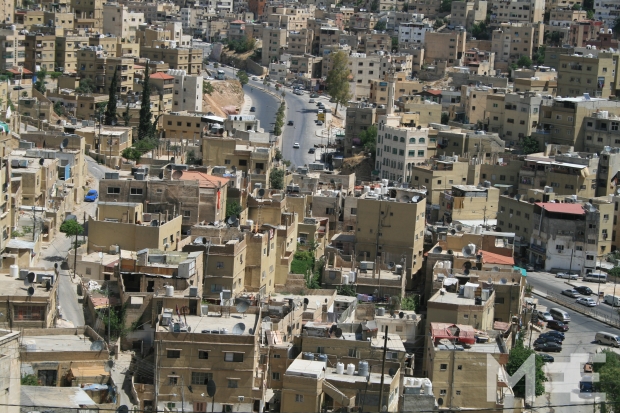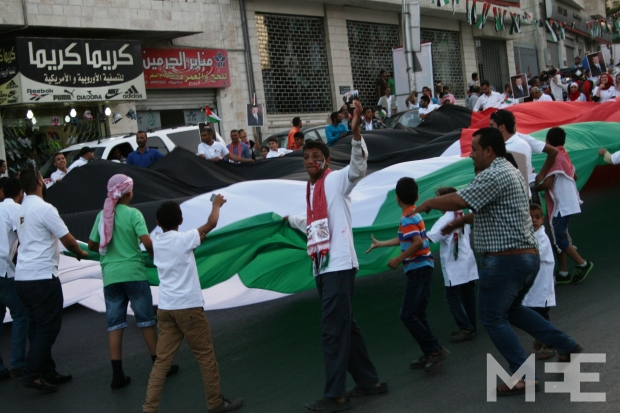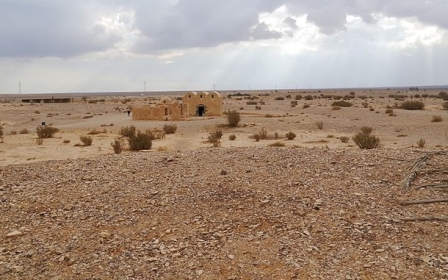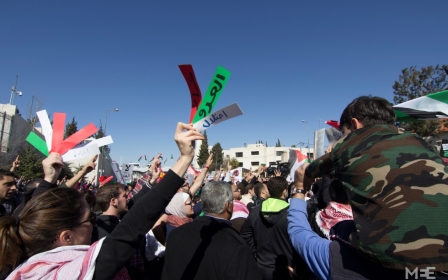Jordan – one man’s oasis, another man’s desert
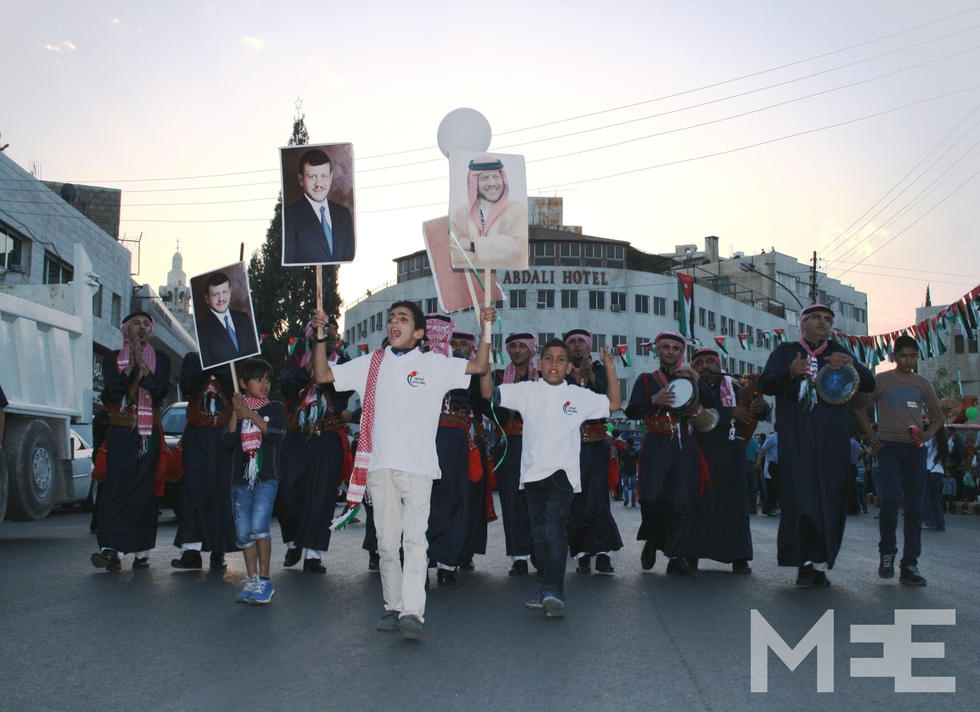
Jordan, a country with few natural resources, notably water, has nevertheless an extraordinary and decades-long history of hosting refugees as they flee turmoil in the region. Since the beginning of the Syrian war in 2011, Jordan’s population has increased 20%, pushing already fragile infrastructure to its limit and exacerbating domestic unemployment as the new arrivals seek out what work they can.
The violence that is tearing apart its neighbours is also wrecking Jordan’s trade in the region, curbing its ability to finance internal needs. Former prime minister Samir al-Rifai told MEE that the country’s debt has increased by 100% since the start of the Syrian crisis. The in-pouring of refugees has meanwhile had a huge impact on schools, hospitals, and security as well as on imports.
Of 4 million Syrian refugees registered by the UN Refugee Agency (UNHCR), more than 620,000 are in Jordan, already the second water poorest country globally.
Welcomed
Two years ago, Umm Fadi’s husband and son-in-law were killed in the Syrian conflict and she and her remaining family fled for Jordan’s capital Amman. Umm Fadi sits on the floor of the bright two-roomed apartment and talks to MEE.
“Alhamdulillah”, she says repeatedly, thanking God, and says the family of 11 moved to this East Amman suburb after it was suggested by friends. Umm Fadi says they are more than grateful for the welcome they’ve received. The relatively quiet, middle-class neighbourhood has very few poor families and locals have been generous and accepting towards them.
Local humanitarian workers explain that not everyone in Jordan feels as benevolent towards the urban refugees. As well as allegations of mismanagement and unfair distribution of aid, there are increasing tensions between the locals and refugees as Jordanian rents increase steeply and employment opportunities decrease.
In the fluid Middle East where priorities for actors change as fast as the dynamics, former prime minister Rifai expressed disappointment with the amount of international support the country has received.
“There has been some, but it really is a drop in the sea compared with the amount of challenges. If we are to be a moderating, moderate country, an oasis in a rough sea, we need to be supported.”
He said the combination of Syrian, Iraqi and Palestinian refugees together with Egyptian workers and other Asian groups means that 4.5 million of his country’s current 11 million population are non-Jordanian.
Some 80% of Syrian refugees in Jordan live in urban areas, with most in the northern cities of Mafraq and Irbid. It comes as no surprise that some are getting lost within already overwhelmed systems.
Umm Fadi claims the family applied for specific support to agencies two years ago but have heard nothing. She said each family member does however receive a monthly food coupon worth 12 Jordanian dinars ($17) to be spent at supermarkets. The family are adamant they want to remain in the city instead of in one of Jordan’s sprawling refugee camps and say that although there are more services, housing conditions in the camps are dehumanising.
The nine children in the family run around excitedly, and the overcrowded apartment resembles a small kindergarten. Umm Fadi and her daughter Rana are pleased the children now attend local schools, where they are settling in slowly.
The adults talk fondly of when the children would play happily outside the home in Syria but say they are too nervous to do that here. Umm Fadi says they were all frightened by the sound of fireworks during recent Independence Day celebrations and she laughs incongruously as she describes the moment when the roof of the family’s home collapsed on their heads during the war.
School volunteers in Amman say some state schools are running double the usual classes by holding extra sessions in the afternoons. Often the same teacher will teach both classes comprising of 40 to 50 children.
‘’Some of the Syrian children do not understand anything,’’ said one volunteer. ‘’They just stare at you. The school books are different, and it’s a completely different culture. ’’
Frustrated
Ten minutes from Umm Fadi’s home in the southern part of the neighbourhood, Jordanian couple Suzan and Raed recently moved to a new apartment after being evicted from their home. Both are unemployed, and the family faced difficulties paying their rent.
Suzan, a teacher, claims landlords are looking for any excuse to evict Jordanian tenants as they can get higher rents for Syrian families. She claims the evictions are carried out in covert ways, with landlords finding excuses to evict people on lower incomes, knowing they can charge higher rents for Syrians. Suzan’s family have helped the couple financially in the past, but she said she is too embarrassed to keep asking them.
She says she and Raed have had to sell most of their furniture to buy food while he searches daily for work. When employed, he will earn an average Jordanian wage of 300JD per month ($424) and their monthly rent is 200JD. Suzan says also feels frustrated and angry as it is becoming common for local employers to give jobs to Syrians, who will work for half the wages (150JD).
Asked about the impact of the refugees on the local labour market, a wealthy Amman resident wasn't shocked. “It’s natural,” he said. “If the Syrian will do my garden for 5JD, I’m going to ask him instead of paying 10JD to someone else.”
A recent survey by the International Labour Organisation confirms that one man’s oasis is potentially another man’s desert, finding that unemployment figures in the country have risen from 14.5% prior to the Syrian crisis to 22.1% at present.
Rifai says that unemployment is more likely to be between 30 and 40%, but despite the surrounding death and destruction, Jordan is determined to build futures for young people.
A week after Jordan hosted the World Economic Forum on the Middle East and North Africa on 21-23 May, and with thousands of flags still flying high after the 69th Independence Day celebrations on 25 May, Adnan Abu Odeh, a former minister of information, said the government “should have expected” the problems arising from the influx of refugees.
“We should be diplomatically negotiating a safe place in Syria so as not to compete with our labour and drink our water. Teachers here are driving taxis in the afternoons - this is the real meaning of poverty,’’ he told MEE.
New MEE newsletter: Jerusalem Dispatch
Sign up to get the latest insights and analysis on Israel-Palestine, alongside Turkey Unpacked and other MEE newsletters
Middle East Eye delivers independent and unrivalled coverage and analysis of the Middle East, North Africa and beyond. To learn more about republishing this content and the associated fees, please fill out this form. More about MEE can be found here.


